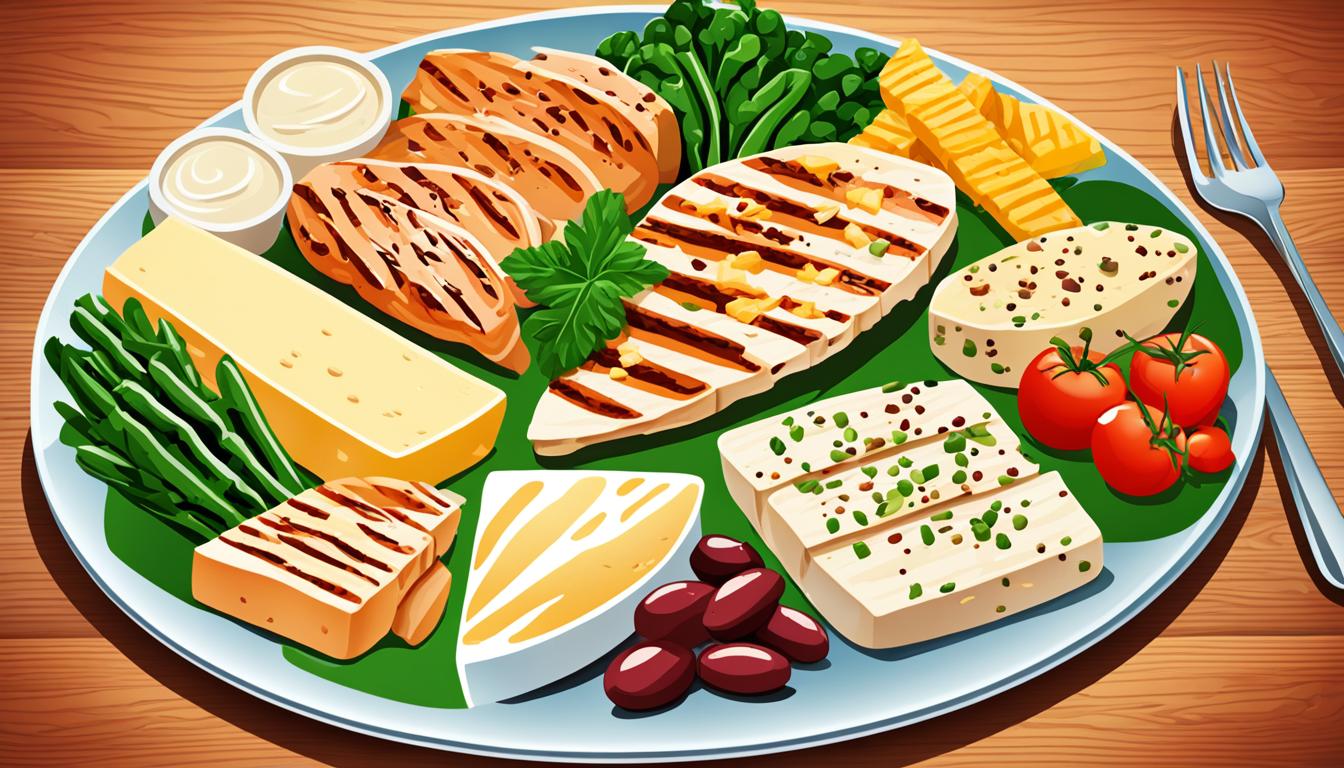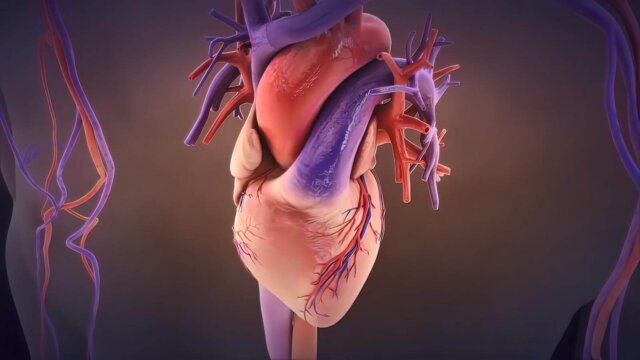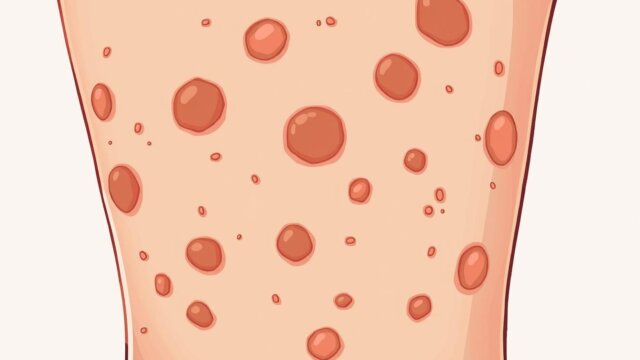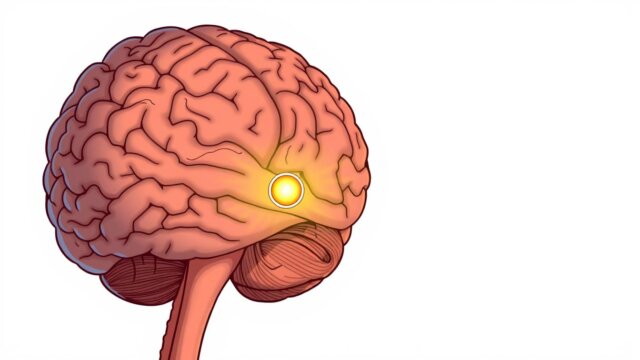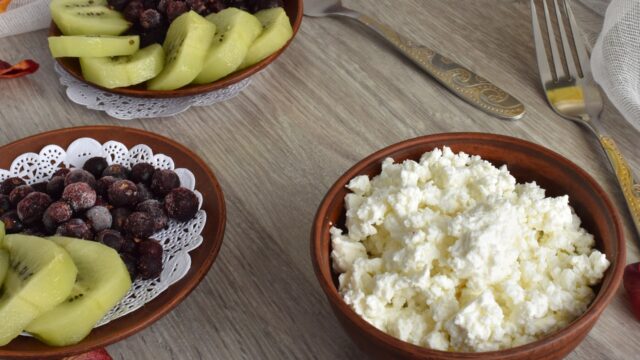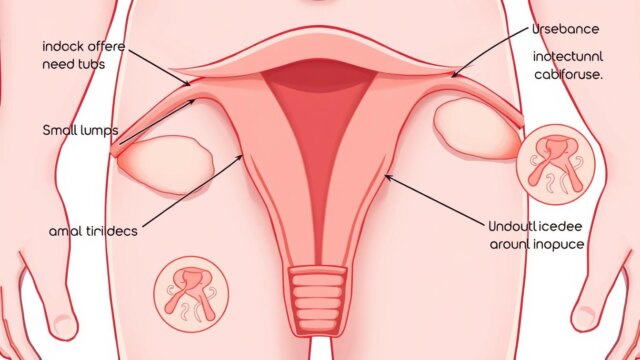FTC disclaimer: This post may contains affiliate links and we will be compensated if you click on a link and make a purchase.
Do you know how much protein the average American adult needs each day? It’s about 5.5 ounces. Luckily, there are many lean protein sources to choose from. They can help you reach this goal and keep your diet healthy. Let’s dive into what lean proteins are and why they matter.
We’ll also look at the best lean protein options. You can find them in seafood, poultry, plants, dairy, meat, nuts, seeds, and grains.
Key Takeaways
- Lean proteins are those with less than 10 grams of total fat, 4.5 grams or less of saturated fat, and 95 milligrams or less of cholesterol in a 3.5-ounce serving.
- Lean proteins help build and keep muscles strong, help your body work well, and make you feel full.
- Good sources are seafood, poultry, plants, dairy, and some types of meat.
- Eating different lean proteins gives you important nutrients like iron, zinc, B12, and omega-3s.
- They are a big part of a diet that’s full of nutrients and good for you.
What are Lean Proteins?
Definition of Lean Proteins
Lean proteins have less than 10 grams of total fat. They also have 4.5 grams or less of saturated fat. And 95 milligrams or less of cholesterol are in each 3.5-ounce cooked serving.
These nutrients are crucial. Too much saturated fat and cholesterol can lead to heart disease. It’s important to keep an eye on them.
Importance of Lean Proteins in a Balanced Diet
Lean proteins are a key part of a healthy, balanced diet. They give our bodies what they need to grow and heal muscles. They also help make us feel full, which can keep our weight in check.
Many foods with lean proteins are also full of vitamins and minerals. These include B vitamins, iron, zinc, and selenium. Adding them to your meals is a smart move for good health.
Lean Protein Sources from Seafood
White-fleshed fish, for example, cod, are great for lean protein. They have under 3 grams of fat. You’ll get 20-25 grams of protein and 85-130 calories in a 3.5-ounce serving. They may have less omega-3 than fatty fish like salmon. But, they’re still a good source of healthy protein.
White-Fleshed Fish
Unbreaded, frozen shrimp make an easy, healthy meal. They have 110 calories and 22 grams of protein in 3 ounces. Lobster is another smart choice. It has 22 grams of protein and very little fat in a 3.5-ounce serving.
Shrimp and Lobster
Fatty fish like salmon and tuna are great for you, too. Yes, they have more fat, but it’s the good kind that’s friendly to your heart. In fact, salmon has 22.5 grams of protein in a 3.5-ounce serving. Tuna is even better with 25.5 grams of protein in the same amount.
Fatty Fish like Salmon and Tuna
Fatty fish such as salmon and tuna are not just delectable additions to your diet; they are nutritional powerhouses brimming with lean protein.
Recent studies have highlighted the remarkable health benefits these fish offer, particularly their rich content of omega-3 fatty acids, which play a crucial role in cardiovascular health and cognitive function. These essential fats help reduce inflammation, lower blood pressure, and even improve mood.
Moreover, research has shown that the high-quality protein found in salmon and tuna can support muscle repair and growth, making them excellent choices for those seeking to build muscle or recover post-exercise.
Unlike other protein sources that may come with added saturated fats, fatty fish provide clean energy without compromising heart health.
Lean Protein from Poultry
Chicken and turkey breasts are great for lean protein. They give about 30 grams of protein in a 3.5-ounce (100-gram) serving when cooked. To keep them lean, take off the skin before or after cooking. The skin holds a lot of the fat.
The American Heart Association (AHA) suggests choosing skinless poultry. This cuts down on saturated fat. A single drumstick without skin has 26.1 grams of protein.
Plant-Based Lean Proteins
Tofu and tempeh are made from soy and are great sources of lean protein. A 3-ounce serving of tofu gives you 9 grams of protein with only 3.5 grams of fat. Tempeh packs in 15.5 grams of protein in a 1/2-cup serving. They are good for your heart and fit well into many meals.
Legumes: Beans, Lentils, and Peas
Beans, peas, and lentils, or legumes, are top plant-protein choices. They have about 20-25 grams of protein in a 1/2 cup serving. These foods are rich in fiber and can help lower bad cholesterol.
Edamame and Soy Products
Edamame are young soybeans and a whole protein source. This means they have all nine essential amino acids. One serving gives you 18.5 grams of protein. You can also choose soymilk and tempeh for other low-fat, high-protein options.
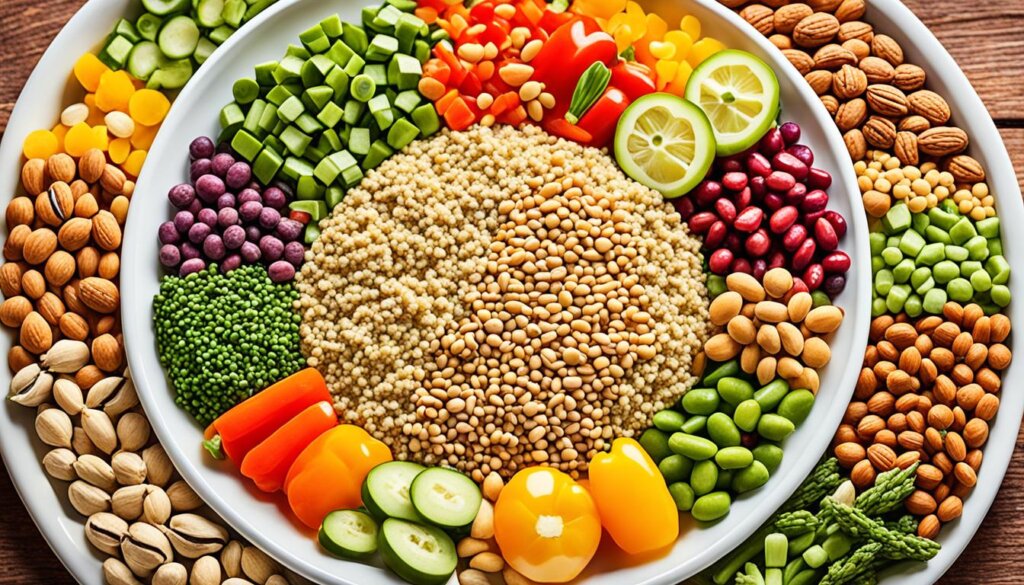
Lean Proteins from Dairy
Low-fat and nonfat dairy products, like milk and yogurt, are great for lean protein. A 1-cup serving of low-fat (1%) milk has 8 grams of protein. Also, 6 ounces of plain, low-fat Greek yogurt gives about 9 grams of protein. That’s almost double what’s in regular yogurt.
Low-fat cottage cheese is also an awesome lean protein choice. One cup (226 grams) has 163 calories, 2.5 grams of fat, and 28 grams of protein. It’s full of calcium and other key nutrients like potassium, phosphorus, magnesium, and zinc.
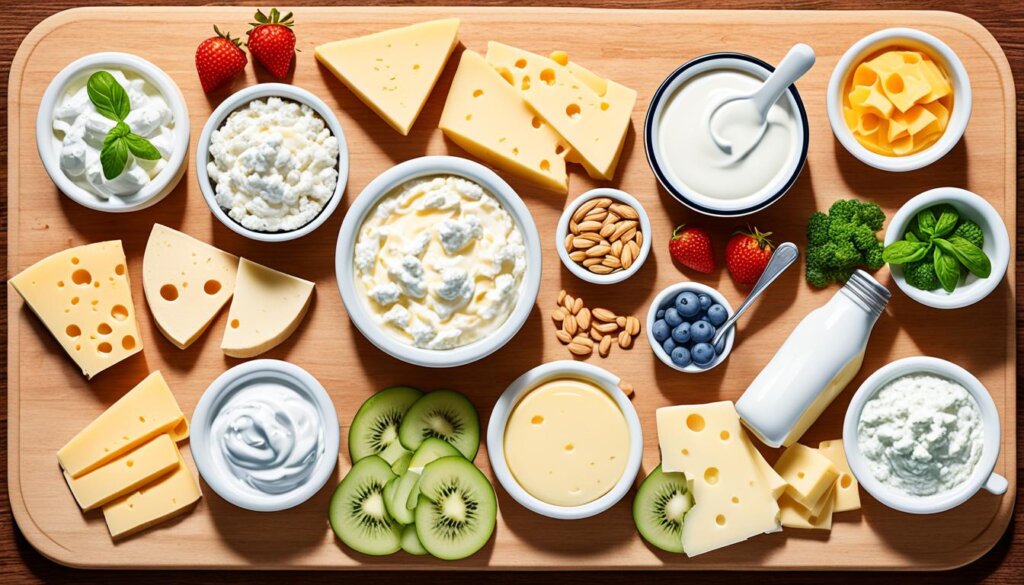
Lean Proteins from Meat
Lean beef cuts are good options. Look for “loin” or “round” on the label. They have less than 10 grams of total fat and under 4.5 grams of saturated fat in a 3.5-ounce cooked serving. For ground beef, choose 90% lean to keep the fat and calories low.
Both pork tenderloin and pork loin chops are lean pork. They have less than 10 grams of fat and no more than 4.5 grams of saturated fat in a 3.5-ounce cooked serving, meeting USDA’s lean criteria. Pork tenderloin is the leanest. In 3.5 ounces cooked, it has 109 calories, 21 grams of protein, and 2.7 grams of fat.
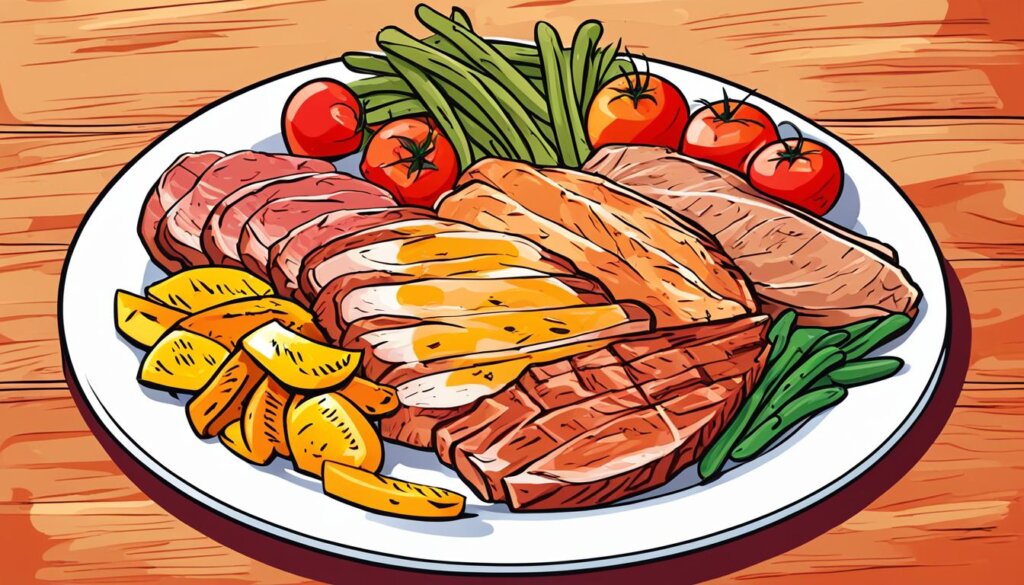
Lean Proteins from Nuts and Seeds
Regular peanut butter is high in calories and fat. Powdered peanut butter is a lower-calorie option. It also has less fat but still a good amount of protein. For instance, 3.5 ounces (100 grams) has 375 calories, 8 grams of fat, and 33 grams of protein. It’s a great source of lean protein.
Chia, flax, and sunflower seeds are full of lean protein too. For instance, just 1 ounce (28 grams) of chia or flax seeds gives you about 5 grams of protein. The same amount of sunflower seeds has 6 grams of protein.
Lean Proteins from Grains
Whole grains add to your protein choices. Quinoa is a great pick. It’s a plant protein and a complete one at that. A cup of cooked quinoa offers 8 grams of protein. It’s a smart choice for any meal or snack due to its high nutrient content.
Brown rice and oats are also great for lean proteins. Cooked brown rice has 5.5 grams of protein in each cup. Cooked oats are even better with 11 grams of protein in the same amount. Including these grains in your meals can boost your protein intake.
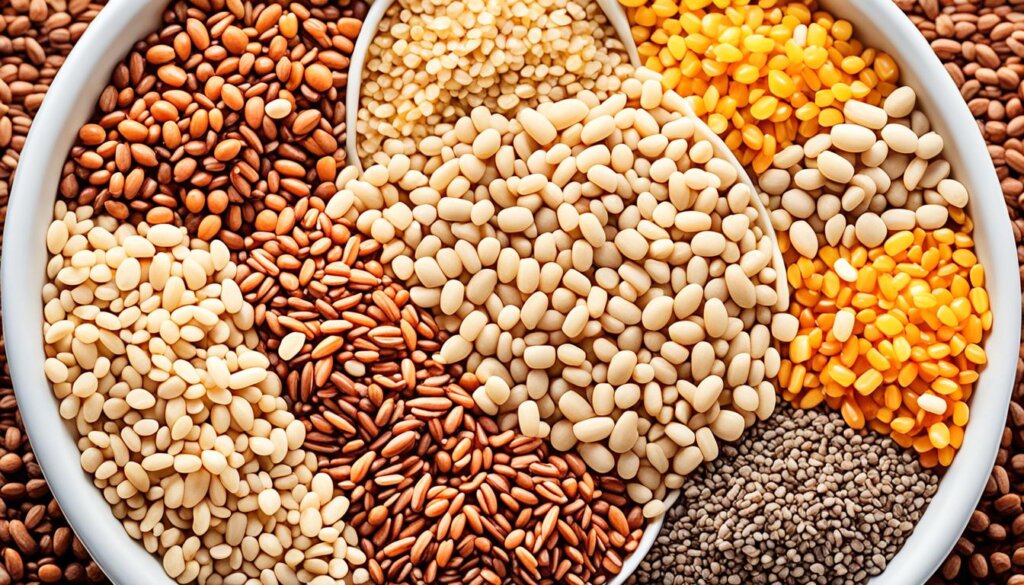
Incorporating Lean Proteins into Your Diet
To incorporate more lean proteins into your diet, choose whole foods. Look for options like seafood, poultry, legumes, dairy, and whole grains. Pick low-sugar and low-sodium choices while shopping. Buying in bulk or frozen can save money. Trying new lean protein sources keeps meals interesting and your taste buds happy.
Eating a mix of lean protein sources helps you get enough protein each day. It also helps you keep a balanced diet. Starting your day with lean proteins, such as Greek yogurt, tofu, or cottage cheese, supports managing a healthy weight. Using protein powders, like whey protein, boosts hormones that make you feel full. This can help with losing weight.
When picking proteins, go for low-saturated fat and cholesterol options. Fish with white flesh, such as cod, haddock, and tilapia, have little fat but lots of protein. They’re also low in calories. Skinless white poultry, like chicken or turkey breast, is rich in protein. It’s a great choice. Lean beef has low fat content too, making it a good protein source.
Adding plant-based lean proteins can also bring variety to your meals. Tofu, tempeh, beans, lentils, and peas are some options. Dairy products, such as low-fat milk and Greek yogurt, are also good sources of lean protein.
Focusing on these lean protein sources helps you meet your daily protein needs. It also supports your overall health and wellness.
Conclusion
Lean proteins are key for a healthy diet, giving your body good protein without lots of bad fat and cholesterol. Explore many options like seafood, poultry, plants, dairy, meats, nuts, seeds, and grains. You’ll meet your protein needs while staying healthy.
Eating more lean proteins can help a lot. It can give you a better body, healthier blood fats, and lower risk of muscle loss and weakness. You can choose lean beef, pork, low-fat dairy, or plants like beans and edamame. There are so many tasty and good-for-you ways to get enough of these important nutrients.
Make lean proteins a big part of your eating plan for a better, more balanced life. This choice can really move you toward your health aims and keep you strong and lively for the long term.
FAQ
What are lean proteins?
Lean proteins are low in fat, have little saturated fat, and are low in cholesterol. They should have less than 10 grams of fat.
Why are lean proteins important in a balanced diet?
They help your body build strong muscles. Lean proteins also make you feel full, which is good for managing your weight.
What are some examples of lean protein sources from seafood?
Fish like cod, haddock, and tilapia are great options. Shrimp and lobster without breading are also good for you.
What are some lean protein options from poultry?
Chicken and turkey breasts are top choices for lean protein. They each have about 30 grams of protein in a 3.5-ounce serving.
What are some plant-based lean protein sources?
Tofu, tempeh, and lentils are very good sources. So are beans, peas, and edamame; they have a lot of protein.
What are some lean protein options from dairy?
Low-fat milk and yogurt are great sources of lean protein. So is low-fat cottage cheese.
What are some lean protein choices from meat?
Some lean meat choices are beef loin and pork tenderloin. Pork loin chops are also good lean proteins.
What are some lean protein options from nuts and seeds?
Nuts and seeds like chia and flax have healthy, lean protein. Powdered peanut butter is another good choice.
What are some lean protein choices from grains?
Grains like quinoa, brown rice, and oats are also sources of lean protein. They are good for you.
How can I incorporate more lean proteins into my diet?
Choose foods that are fresh and less processed. Use seafood, poultry, and legumes for protein. Add dairy and grains, making sure they are low in sugar and salt. Buying in bulk or frozen can save money.
